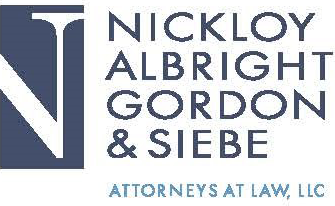Serving Central Indiana
Probate Attorneys
Business Law Advisors
Veteran Discounts
Emergency Consultations
Hours:
Complete Assistance With the Estate Probating Process
When a family member is deceased, you have to decide what you're going to do with the deceased person's property. Probate is the judicial process in which the court authenticates the final testament the deceased person has made.
In most cases, the testament specifies how the property and assets are to be distributed to the heirs or beneficiaries. If you're unsure of the details stated in the will or if you have any other questions, call the attorneys at Nickloy, Albright, Gordon, & Siebe. We can answer all your questions and make the probating process as smooth as possible.
For individuals who pass away with fewer assets to their name, the family of the deceased can file a small estate affidavit in the court. But, for other individuals who pass away with more assets, and an estate must be opened with the court's permission by a personal representative.
The personal representative has the legal authority to value the estate's assets, pay bills and taxes, and distribute the assets to the heirs or beneficiaries.
Documents Necessary for the Estate Probate Process
- Wills, trusts, or testaments
- Insurance policies and retirement plans
- Estate planning documents
- Birth and death certificates
- Checkbook and check register
- Marriage license(s)
- Military discharge papers
- Driver’s license and social security card (and passport, if applicable)
- Deed to house and title to any vehicles
- Tax returns from the last two years
- Date of death of your spouse (if applicable)
- Date(s) of divorce(s) (if applicable)
- Beneficiary contact information
- Any other “legal” documents
- Stock certificates, bonds, annuities, CD statements, and any other investment accounts
Get Comprehensive Probate Assistance
Call us today to schedule your consultation.
(317) 773-3030


Share On: